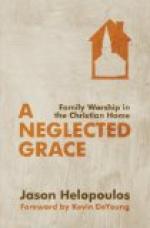“Home! ’tis a blessed name!
And they who rove,
Careless or scornful of its pleasant bonds,
Nor gather round them those linked soul
to soul
By nature’s fondest ties,...
But dream they’re happy!”
But what is home,—home in the sphere of nature? It is not simply an ideal which feeds the fancy, nor the flimsy emotion of a sentimental heart. We should seek for its meaning, not in the flowery vales of imagination, but amid the sober realities of thought and of faith.
Home is not the mere dwelling place of our parents, and the theater upon which we played the part of merry childhood. It is not simply a habitation. This would identify it with the lion’s lair and the eagle’s nest. It is not the mere mechanical juxtaposition of so many human beings, herding together like animals in the den or stall. It is not mere conventionalism,—a human association made up of the nursery, the parlor, the outward of domestic life, resting upon some evanescent passion, some sensual impression and policy. These do not make up the idea of home.
Home is a divine institution, coeval and congenital with man. The first home was in Eden; the last home will be in Heaven. It is the first form of society, a little commonwealth in which we first lose our individualism and come to the consciousness of our relation to others. Thus it is the foundation of all our relationships in life,—the preparation-state for our position in the State and in the Church. It is the first form and development of the associating principle, the normal relation in which human character first unfolds itself. It is the first partnership of nature and of life; and when it involves “the communion of saints,” it reaches its highest form of development. It is an organic unity of nature and of interest,—the moral center of all those educational influences which are exerted upon our inward being. The idea of the home-institution rests upon the true love of our moral nature, involving the marriage union of congenial souls, binding up into itself the whole of life, forming and moulding all its relations, and causing body, mind and spirit to partake of a common evolution. The loving soul is the central fact of home. In it the inner life of the members find their true complement, and enjoy a kind of community of consciousness.
“Home’s not merely four square
walls,
Though with pictures hung and gilded;
Home is where affection calls—
Filled with shrines the heart hath builded.”
Home may be viewed in a two-fold aspect, as simply physical, and as purely moral. The former comes finally to its full meaning and force only in the latter. They are interwoven; we cannot understand the one without the other; they are complements; and the complete idea of home as we find it in the sphere of nature, lies in the living union of both.




